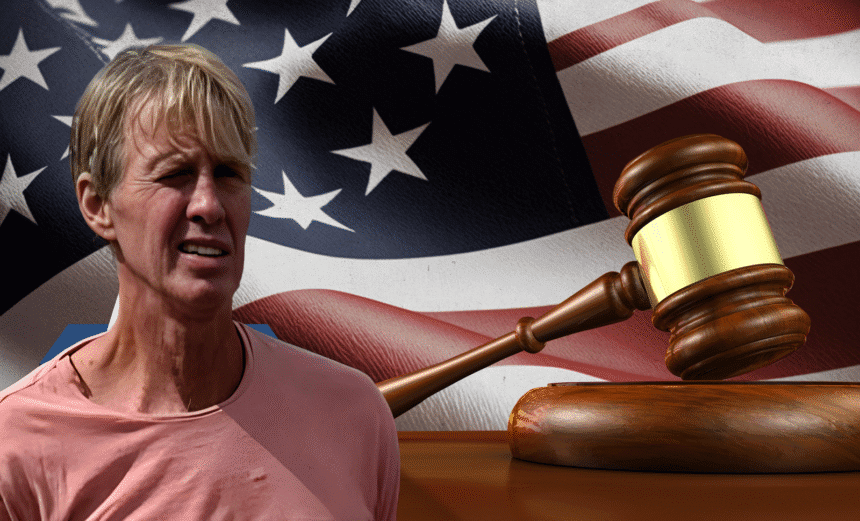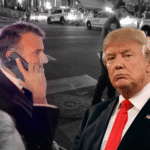A Florida courtroom descended into chaos on September 23, 2025, when 59-year-old Ryan Wesley Routh was found guilty of attempting to assassinate former President Donald Trump. As the jury foreperson read out the verdict, Routh suddenly tried to stab himself in the neck with a pen. U.S. marshals leapt into action, wrestling him to the ground and removing him from the room. His daughter, visibly distressed, cried out, “Dad, I love you. Don’t do anything, I’ll get you out,” as the courtroom reeled from the shocking scene.
The guilty verdict comes more than a year after the alleged attempt on Trump’s life at Trump International Golf Club in West Palm Beach, Florida. On September 15, 2024, Secret Service agents spotted Routh lying in wait in the shrubbery, a Soviet-style SKS rifle concealed nearby. Authorities later determined he had been conducting surveillance at the golf course for weeks, studying Trump’s movements and rehearsing potential opportunities to strike. When an agent noticed the muzzle of the weapon protruding from the bushes, he fired at Routh, who dropped his rifle and fled. Routh was apprehended later on a nearby interstate, still carrying evidence that tied him to the plot.
Federal prosecutors charged Routh with a series of serious counts: attempted assassination of a major presidential candidate, assaulting a federal officer, possession of a firearm in furtherance of a violent crime, possession of a firearm by a convicted felon, and possession of a weapon with an obliterated serial number. During the trial, which began earlier this month in Fort Pierce, Florida, prosecutors presented extensive evidence against him. Investigators had recovered multiple cell phones linked to Routh, surveillance notes, and forensic ties to the recovered rifle. They also discovered a written letter in which Routh appeared to solicit others to complete the killing if he could not.
The jury took just two hours to deliberate before unanimously returning a guilty verdict on all counts. Assistant U.S. Attorneys argued that Routh had taken concrete steps toward assassinating Trump, including procuring a firearm, conducting surveillance, and attempting to position himself for a clear shot. They described his actions as “premeditated, dangerous, and deliberate.” Trump himself was unharmed in the 2024 incident, and no shots were ever fired, thanks to what prosecutors described as “quick action” by the Secret Service.
In a bizarre twist, Routh acted as his own attorney during the proceedings, a decision that many legal observers called reckless. He attempted to argue that he never intended to fire the rifle and suggested that his actions were misinterpreted. However, prosecutors countered with surveillance evidence and testimony that painted a clear picture of his intent. Witnesses confirmed that Routh had scoped out the golf course repeatedly and concealed himself in anticipation of Trump’s presence.
The courtroom drama at the moment of the verdict overshadowed even the gravity of the charges. Routh’s sudden attempt to harm himself appeared to stun both the jury and spectators. Marshals responded swiftly, and after receiving immediate medical attention and a security check, Routh was returned to the courthouse in shackles. He will remain in custody until sentencing, which is scheduled for December 18, 2025. He faces the possibility of life in prison under federal sentencing guidelines.
The case has been viewed by many as a stark reminder of the rising risks of political violence in the United States. It follows another attempt earlier in 2024, when shots were fired at Trump during a Pennsylvania rally. While no lives were lost in either incident, security experts have pointed to an escalation of threats against high-profile political figures in the current climate of polarization. Prosecutors framed the verdict as a defense of democratic institutions, warning that attacks on public officials undermine both personal safety and the rule of law.
For Trump and his supporters, the conviction represents vindication for the Secret Service and federal authorities who foiled the plot. The former president praised law enforcement in public comments, saying that their vigilance prevented tragedy. Meanwhile, Routh’s dramatic outburst has raised new questions about his mental state and whether he is grappling with despair as he awaits sentencing. Regardless of his personal crisis, the outcome of the case sends a strong message- plots against national leaders will be pursued and punished to the fullest extent of the law.
















